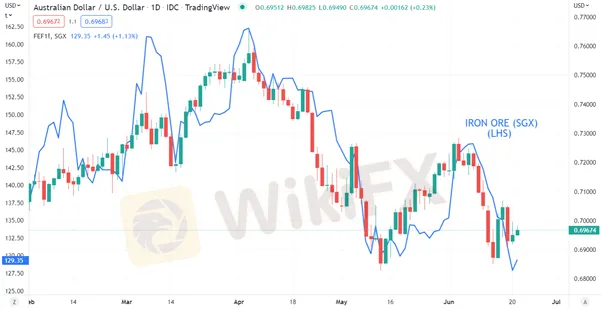简体中文
繁體中文
English
Pусский
日本語
ภาษาไทย
Tiếng Việt
Bahasa Indonesia
Español
हिन्दी
Filippiiniläinen
Français
Deutsch
Português
Türkçe
한국어
العربية
Australian Dollar Bounces on Hawkish RBA
Abstract:AUSTRALIAN DOLLAR, AUD/USD, RBA, YCC, IRON ORE, CHINA- TALKING POINTS
Click Here: After you read it, Daily Routine with WikiFX
The Australian Dollar hasn't changed since the RBA spent the morning talking to the public.
The RBA's media department has had a busy day. Their review of their yield curve control (YCC) program was published, Governor Lowe gave a speech, and the minutes from the June meeting of the monetary policy committee were made public.

Dr. Lowe was giving a speech in Sydney at an event put on by the American Chamber of Commerce. He basically went over the main points of the YCC review again and said the same things he said last week.
Most importantly, the RBA thinks that inflation will reach 7% in the December quarter and that the cash rate could reach 2.5% later this year.
The RBA famously gave up on the YCC program in November 2021, when underlying conditions and the market forces they caused simply made it useless.
The RBA knows that YCC had problems and that when the bank left the program, it hurt its reputation. Most notable was the volatility in the markets when fundamentally it no longer made sense to aim for a certain yield in a certain bond.
The bank said that the fact that it had said an exit from YCC would happen in 2024 was a big problem. When the policy was put into place, it was thought that the economy would grow at a slower rate and at a lower level than it did.
When it comes to inflation, Dr. Lowe pointed out three things that the bank thinks will bring inflation back to their target of 2% to 3% next year:
Pandemic supply problems will be fixed over time.
Technically speaking, inflation is the rate at which prices change, not the level of prices. For inflation to stay high, prices need to keep going up. (This is what the Fed called a “base effect”)
Tightening the world's monetary policy.
All of these are possible options, but they could also cause problems. At the very least, the demand side of inflation is the only thing a central bank can control. The RBA has made it clear that policy is getting tighter so that this can happen.
This week, the Australian Dollar is also being hurt by other things. The price of iron ore has dropped, as have the prices of many other industrial metals. Iron ore futures on both the Singapore Exchange (SGX) and the Dalian Commodity Exchange (DCE) are down about 20% from their April highs.
This is because people are worried about China's zero-case Covid-19 policy, which is hurting the world's second-largest economy.
Even though Beijing is trying to help with policy, sudden lockdowns keep the Chinese real estate market in a state of uncertainty.
Disclaimer:
The views in this article only represent the author's personal views, and do not constitute investment advice on this platform. This platform does not guarantee the accuracy, completeness and timeliness of the information in the article, and will not be liable for any loss caused by the use of or reliance on the information in the article.
Read more

Account Deleted, Funds Gone: A New Broker Tactic to Beware Of?
The main trading dashboard account of a trader for LQH Markets was completely deleted by a broker. The trader is not being offered any access to their funds or profits. This incident shows the risks of trading markets and brokers and the importance of protecting your funds without relying on any broker.

PrimeXBT Expands Trading Options with Stock CFDs on MT5
PrimeXBT launches stock CFDs on MetaTrader 5, offering shares of major U.S. companies with crypto or USD margin for enhanced multi-asset trading.

Broker Comparsion: FXTM vs AvaTrade
FXTM and AvaTrade are two well-established online brokers offering forex and CFD trading across global markets. Both enjoy strong reputations and high ratings on WikiFX—FXTM holds an AAA overall rating, while AvaTrade scores 9.49/10, indicating they’re regarded as reliable choices by the community. However, since brokers have great reputation in the industry, how do we know which one is more suitable for individuals to invest in? Today's article is about the comparison between FXTM and AvaTrade.

Pi Network: Scam Allegations Spark Heated Debate
A whistleblower report has surfaced, casting doubt on the legitimacy of Pi Network, alleging psychological manipulation, opaque operations, and potential financial exploitation. What is your take on this?
WikiFX Broker
Latest News
Love, Investment & Lies: Online Date Turned into a RM103,000 Scam
Broker Took 10% of User's Profits – New Way to Swindle You? Beware!
Pi Network: Scam Allegations Spark Heated Debate
Broker Comparsion: FXTM vs AvaTrade
Broker’s Promise Turns to Loss – Funds Disappear, No Compensation!
Account Deleted, Funds Gone: A New Broker Tactic to Beware Of?
El Salvador and U.S. Launch Cross-Border Crypto Regulatory Sandbox
The Instagram Promise That Stole RM33,000
StoneX Subsidiary, Gain Global Markets Bermuda, Penalized for Trading Misconduct
Kraken Partners with Alpaca to Offer U.S. Stocks and Crypto
Currency Calculator


